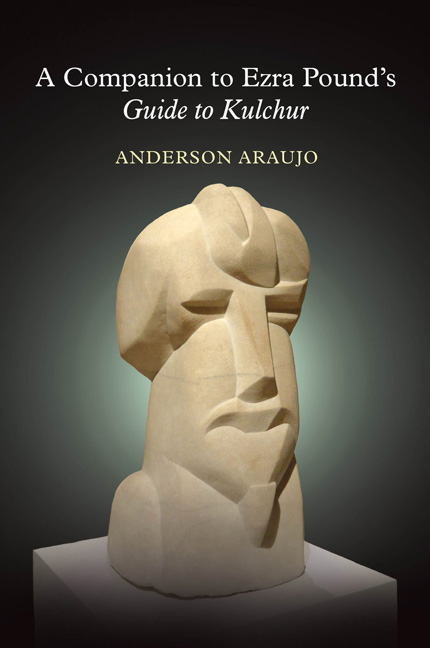Book contents
- Frontmatter
- Contents
- Acknowledgments
- Abbreviations
- Introduction
- Guide to Kulchur
- Part I
- Section I
- Section II
- 6 Vortex
- 7 Great Bass: Part One
- 8 Ici Je Teste
- 9 Tradition
- Part II
- Section III
- Section IV
- Part III
- Section V
- Section VI
- Part IV
- Section VII
- Section VIII
- Section IV
- Part V
- Section X
- Section XI
- Part VI
- Section XII
- Section XIII
- Addenda: 1952
- Notes
- Index
7 - Great Bass: Part One
from Section II
- Frontmatter
- Contents
- Acknowledgments
- Abbreviations
- Introduction
- Guide to Kulchur
- Part I
- Section I
- Section II
- 6 Vortex
- 7 Great Bass: Part One
- 8 Ici Je Teste
- 9 Tradition
- Part II
- Section III
- Section IV
- Part III
- Section V
- Section VI
- Part IV
- Section VII
- Section VIII
- Section IV
- Part V
- Section X
- Section XI
- Part VI
- Section XII
- Section XIII
- Addenda: 1952
- Notes
- Index
Summary
Great Bass: The main tenet in Pound's music theory, presented here as a precis of the ideas he had already developed at length in Antheil and the Treatise on Harmony (1924). In the earlier work, Pound defines music as “a composition of frequencies.” In “Machine Art” (1927–30), he uses the Great Bass “to designate the frequencies below those which the ear has been accustomed to consider as ‘notes.’” In keeping with this, R. Murray Schafer characterizes the Great Bass “as the reduction of a composition to simple frequency ratios, a sort of heterodyne of inscrutable to scrutable elements.” When Pound returns to the second part of this discussion in Chapter 42 of GK, he equates “bass” with “basis,” “the 60, 72, or 84, or 120 per minutes … the bottom note of the harmony” (GK 233). Earlier in the book he says that great composers are unlikely to neglect “this basis” (GK 73). It is only lesser musicians that fumble “about OFF the gt. bass key” (GK 234). Related to this notion is his idea of “pitch” or “a certain frequency of vibration” (GK 73). It informs his proviso in Treatise on Harmony that “A SOUND OF ANY PITCH, or ANY COMBINATION OF SUCH SOUNDS, MAY BE FOLLOWED BY A SOUND OF ANY OTHER PITCH, OR ANY COMBINATION OF SUCH SOUNDS, providing the time interval between them is properly gauged.” Thus, the interdependence of pitch and rhythm is also implicit here. As Albright puts it, “for Pound, every piece of music has a unique tempo, a tempo derived in some sense from its key. To play a piece at the wrong tempo is to render it viscid, sloppy.” Quirky though it may be, the Great Bass was not conceived in a vacuum. Similar ideas were percolating among music theorists in the early decades of the twentieth century. Noteworthy among these is the American musicologist and composer Henry Cowell (1897–1965). Cowell's theorization of the overtone series in his influential New Musical Resources (1930) bears a striking resemblance to Pound's Great Bass.
- Type
- Chapter
- Information
- A Companion to Ezra Pound's Guide to KulcherGuide to Kulcher, pp. 103 - 107Publisher: Liverpool University PressPrint publication year: 2018



